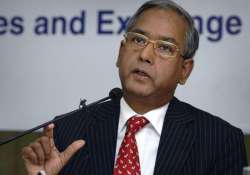CIC declines to disclose assets, liabilities of SEBI chief UK Sinha
New Delhi: The disclosure of details of assets and liabilities of SEBI chief UK Sinha can cause “unwarranted invasion of privacy”, the Central Information Commission (CIC) has said. Hearing a four-year old case, a full-bench

New Delhi: The disclosure of details of assets and liabilities of SEBI chief UK Sinha can cause “unwarranted invasion of privacy”, the Central Information Commission (CIC) has said.
Hearing a four-year old case, a full-bench of CIC has overturned its earlier order in which it had directed that the disclosure be done in larger public interest.
“The Commission is of the considered opinion that the appellant in the instant case has not made a bona fide public interest in seeking information, the disclosure of such information is likely to cause unwarranted invasion of privacy of the individual under Section 8(1)(j) of the RTI Act,” reads the verdict by three Information Commissioners — Basant Seth, Manjula Prasher and M.A. Khan Yusufi.
“It being so, we are not inclined to allow disclosure of the requested information. The matter is dismissed on the said grounds,” the verdict further reads.
The Section bars disclosure of information which has no relationship to any public activity or which would cause unwarranted invasion of the privacy of the individual.
Bangalore-based Arun Kumar Agrawal had in January 2012 filed an RTI application with SEBI seeking details of the assets and liabilities of its chairman for the last three years along with his emoluments and perquisites.
The information was declined in February that year by the SEBI, saying it was held by it in fiduciary capacity. Agrawal had then filed first appeal under the transparency law, which was dismissed as the authority “did not find any merit” in it.
Following which the case was heard by the Commission’s full bench in August 2014 which then allowed “disclosure of the requested information” to the applicant within four weeks time.
Sinha first became the Securities and Exchange Board of India (SEBI) Chairman on February 18, 2011 with a three-year tenure, which was later extended by two years. Days before the end of his tenure in February this year, he was given another extension till March 1, 2017.
Against the full bench order, the SEBI filed a writ petition before Bombay High Court which disposed of the case by returning the matter back to the Central Information Commission with directions to decide the appeal expeditiously after giving personal hearing to the parties.
The Commission then asked all parties — petitioner (Agrawal), respondent (SEBI) and third party (Sinha) — to give their submission.
Agrawal in his submission to the Commission demanded that the SEBI chief disclose the information as it is the conflict of interest as Sinha, being the head of the market regulator, allegedly holds shares of publicly listed shares and mutual fund.
SEBI, in its response, said Sinha had been regularly filing his property returns which were being shared with the central government. The manner in which it can be dealt with and disclosed is a policy decision to be taken by the government of India with regard to all public servants.
“This policy decision was yet to be taken by the government. Whenever this decision taken, it will apply uniformly to all public servants and it will not single out one individual officer at the behest of malafide intention of the appellant,” it had said.
Sinha, in his submission, said he has no objection to the statement of his assets and liabilities made public in pursuance of a government policy applicable uniformly to all public servants.
“However, he has objection to his being singled out for such disclosure at the behest of the appellant, who has a long history of filing vexatious petitions against him, major one of which had been dismissed by the Supreme Court,” reads his response.
The appellant had contended that the chairman SEBI and other employees of the watchdog are investing in shares of the companies, thereby giving rise to conflict of interest and thus warranting disclosure of the information, as sought by him, in public interest.
“This contention is factually incorrect, baseless and deserves to be dismissed,” Sinha said, refuting allegations raised by the appellant against him.
Taking into account all the submissions, the CIC in its latest order on Thursday denied disclosure of the information.